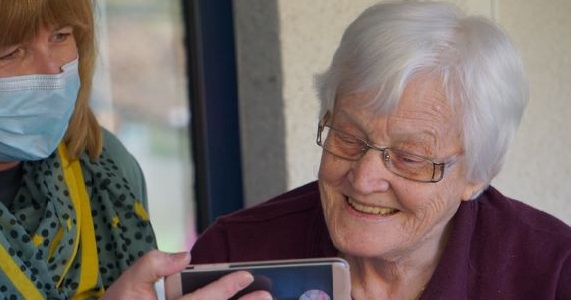When moving into a new home it’s important to make yourself familiar with your new environment. Get to know how your facility runs, spend some time with your new neighbours and develop strong relationships with staff and carers at the nursing home.
Building close relationships in aged care is crucial to enjoying your stay, says Nino DiSisto, Chief Executive Officer (CEO) of Clayton Church Homes (CCH) in South Australia.
He adds it is also important that staff and carers do the same when they have a new resident move into a facility.
“We understand that each of our residents has different needs. Listening, spending time with residents and their families creates understanding that carers genuinely want the best for them,” says Mr DiSisto.

“By having this bond with residents, our carers feel comforted they are making a real difference to the quality of their lives, which is a rewarding experience.”
Tips for developing relationships at a new home
When moving into a new facility, the staff and carers should have measures in place to make your transition into the facility as smooth as possible.
At CCH, new residents are welcomed by Pastoral Care and Lifestyle staff, and they have a “Key to Me” form, which allows residents to describe their interests and lifestyle, Mr DiSisto explains. This allows for the facility to customise the care, activities and programs residents receive or request.
So it is vital you are open and honest about your likes and dislikes when you move into a new facility.
“If your provider doesn’t have anything like this, we suggest you make your interests known so you can continue to enjoy the things you love,” says Mr DiSisto.
It’s a good idea to introduce yourself to your new neighbours and also inquire about any clubs and groups that you have an interest in, so you can meet new people in the facility.
Mr DiSisto adds that new residents should share their stories with staff and carers to create a strong bond with them.
This includes engaging in conversations when staff are free to assist in forming these strong connections quickly.
Mr DiSisto says every resident should feel like they are treated well by their staff, so making friendships at their new facility with both residents and carers can really make an aged care facility feel like home.
“The comfort and welfare of our residents is at the heart of everything we do. We are committed to providing personal, high quality care to all our residents and treat our residents with dignity and respect,” says Mr DiSisto.
Trust and respect is important for everyone
Older people moving into aged care for health-related reasons, particularly after a hospital stay, can feel a massive loss in independence, whether that means they require more personal care or assistance doing minor tasks.
It is important this care is provided by a carer or staff member you can trust and feel that they respect you.
In the new 2019 Aged Care Quality Standards, it is mandated that all people in aged care must be respected while receiving aged care services.
The same can be said for aged care workers who should also be respected while providing services and may be working with multiple residents throughout the day. Remember that aged care staff are there to help you through whatever personal issues or health-related problems you may have.
It is vital that there is mutual respect and trust between aged care workers and their residents so care can be provided and received in the best way possible.
Mr DiSisto says, “We absolutely agree that trust, honesty and respect are crucial to developing the bonds and relationships between residents and carers. These qualities are needed to develop a meaningful connection.
“When residents receive personal, genuine care and are treated with dignity and respect, they feel supported, secure and comfortable being themselves in a loving environment.
“By nurturing a relationship and showing sensitivity, aged care staff can support not only residents’ physical needs, but importantly also their emotional needs and wellbeing.”
Aged care homes fostering good relationships
From the first entry of a resident into a new home, your aged care provider should be making the effort to develop connections with you and the care you require.
An aged care provider would normally sit down with you and get to know your personality and your likes and dislikes, which can help inform how they provide you care.
Mr DiSisto says that CCH makes sure that from the first enquiry to admission, potential or new residents feel like they will be safe and respected within their facility.
Your aged care facility should be taking steps to make sure you have regular communication with staff, particularly face to face, so you don’t feel isolated and have a good relationship with the carers around you. This could be popping in to see how you are doing or joining you for lunch.
Additionally, aged care staff at CCH also make regular contact with residents in pastoral care programs, monthly meetings, and at the café and coffee sessions.
Many aged care facilities also keep their residents informed about any new updates through regular newsletter communications that list any events, changes and new developments.
What if I have a complaint or concern?
If you’ve developed a good relationship with your provider you should be able to provide feedback about the care you are receiving, whether this is good or bad.
Many older people, and families, worry about bringing up complaints about quality of care or other matters. Especially older residents, may be concerned that there will be consequences if they speak out.
However, Mr DiSisto says all aged care facilities should accept and take on board all complaints from residents and families, and aged care residents should never feel worried about bringing up any concerns.
“We welcome residents and their families to come to us to openly talk about any concerns they may have,” says Mr DiSisto.
“We offer various options to residents and their families to have these conversations, depending on what they feel comfortable with.
“They can discuss with the senior Registered Nurse on-site, clinical Nurse, site manager or with the administration team.
“Every conversation is treated sensitively and confidentially.”
If you have any concerns you should try to address this with your provider first. If you believe your complaint has not been heard, you can contact the Aged Care Quality and Safety Commission, or the Older Persons Advocacy Network, for assistance.
Source : Aged Care Guide November 2020
This article was originally published on agedcareguide.com.au https://www.agedcareguide.com.au/information/how-to-create-a-good-relationship-with-your-new-aged-care-facility. Reproduced with permission of DPS Publishing
Important: This provides general information and hasn’t taken your circumstances into account. It’s important to consider your particular circumstances before deciding what’s right for you. Although the information is from sources considered reliable, we do not guarantee that it is accurate or complete. You should not rely upon it and should seek qualified advice before making any investment decision. Except where liability under any statute cannot be excluded, we do not accept any liability (whether under contract, tort or otherwise) for any resulting loss or damage of the reader or any other person.
Any information provided by the author detailed above is separate and external to our business and our Licensee. Neither our business nor our Licensee takes any responsibility for any action or any service provided by the author. Any links have been provided with permission for information purposes only and will take you to external websites, which are not connected to our company in any way. Note: Our company does not endorse and is not responsible for the accuracy of the contents/information contained within the linked site(s) accessible from this page.



